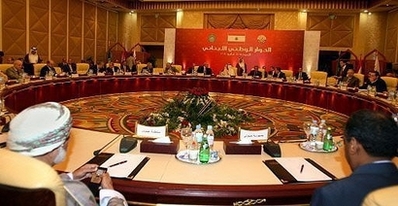 DOHA – Rival leaders tackled divisive issues at the heart of Lebanon’s political crisis on Saturday at Qatari-mediated talks aimed at pulling their country back from the brink of civil war. Government and opposition leaders left a conference room separately in the morning, after 90 minutes of tense talks. Delegates said a six-member committee established at that session and asked to create a framework for a new election law had already made progress. Qatari Prime Minister Sheikh Hamad bin Jassim bin Jabr al-Thani is holding consultations to bring rival leaders closer to a deal on the framework for a new government. "The impression, thank God, from the session, shows the desire among all the factions to reach an understanding … that will bring us to the beginning of a solution to this crisis," Prime Minister Fouad Siniora told Voice of Lebanon radio. "We have to have faith and trust that we will do the impossible until we find solutions to this difficult stage that Lebanon has faced the past two weeks."
DOHA – Rival leaders tackled divisive issues at the heart of Lebanon’s political crisis on Saturday at Qatari-mediated talks aimed at pulling their country back from the brink of civil war. Government and opposition leaders left a conference room separately in the morning, after 90 minutes of tense talks. Delegates said a six-member committee established at that session and asked to create a framework for a new election law had already made progress. Qatari Prime Minister Sheikh Hamad bin Jassim bin Jabr al-Thani is holding consultations to bring rival leaders closer to a deal on the framework for a new government. "The impression, thank God, from the session, shows the desire among all the factions to reach an understanding … that will bring us to the beginning of a solution to this crisis," Prime Minister Fouad Siniora told Voice of Lebanon radio. "We have to have faith and trust that we will do the impossible until we find solutions to this difficult stage that Lebanon has faced the past two weeks."
Host Qatar offered to come up with a compromise after leaders of the pro-government March 14 parliamentary bloc insisted on listing Hezbollah’s arms on the agenda of the dialogue, said the delegate, requesting anonymity. Qatari Prime Minister Sheikh Hamad bin Jassem bin Jabr al-Thani "offered to come up with a proposal on the Hezbollah weaponry issue and present it to the two parties," a Lebanese delegate told AFP. "The two sides have agreed to that," he added following the first session of Arab-mediated talks by 14 leaders. The Qatari hosts will be working against the backdrop of two United Nations Security Council resolutions calling for the disarmament of all militias in Lebanon. Despite disagreement over the arms question, the delegates did agree to form a committee of three members from each side to address the issue of a new electoral law for parliamentary polls due next year, the delegate said.In addition to the electoral law, the leaders are expected to discuss a proposed unity government.Both sides have already agreed on army chief Michel Sleiman



